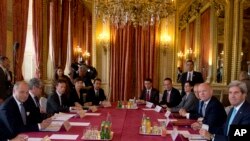United Nations inspectors say there is "clear and convincing evidence" that chemical weapons were used on a relatively large scale in an attack in Syria last month that killed hundreds of people.
In a report issued Monday, inspectors said environmental, chemical and medical samples show "unequivocally and objectively" that "surface-to-surface rockets" containing the nerve agent sarin were used in the Ghouta area of Damascus' on August 21.
The report cited survivors who reported "a military attack with shelling," followed by an onset of symptoms including "blurred vision, nausea, vomiting and an eventual loss of consciousness."
The inspectors were asked to determine whether chemical weapons were used, and not who unleashed them.
Conclusions
Evidence
Source: UN
But the Obama administration said the U.N. report makes it clear that President Bashar al-Assad's government was responsible for the attack that Washington says killed more than 1,400 last month. A White House spokesman noted that only the Syrian army has surface-to-surface rockets.
Britain's U.N. envoy echoed the comments, saying the report leaves "no remaining doubt" that the Syrian government was responsible for the August 21 attack. Syria maintains it was rebel fighters, not government forces, who were responsible.
Almost all of the biomedical samples examined tested positive for sarin exposure, including 93 percent collected from urine and 88 percent from blood. A majority of the rockets or rocket fragments recovered also were found to be carrying sarin.
U.N. chief Ban Ki-moon called the use of chemical weapons in Syria a "war crime" and demanded the threat of sanctions to support a plan to destroy the arms. He said the August 21 attack is the "most significant use of chemical weapons" since former Iraqi president Saddam Hussein ordered their use against the Kurdish town of Halabja in 1988.
In Geneva, the U.N. Commission of Inquiry on Syria said it is investigating 14 alleged attacks with chemical weapons or chemical agents in Syria over the last two years. The report is expected to add momentum to a deal to eradicate Syria's chemical weapons program.
Earlier Monday, the U.S., France and Britain agreed on the need for a strong United Nations resolution that sets precise and binding deadlines for Syria to give up its chemical weapons.
British Foreign Secretary William Hague said the task is difficult and complex, but he stressed the need to maintain pressure on Assad's government.
“It is the Assad regime that has stockpiled these weapons and that has used them repeatedly against the Syrian people, so the pressure is on them to comply with this agreement in full. The world must be prepared to hold them to account if they don’t, and our three countries are certainly determined to do so,” said Hague.
Hague spoke alongside French Foreign Minister Laurent Fabius and U.S. Secretary of State John Kerry after they met in Paris. The talks came days after the U.S. and Russia announced a plan that calls on Syria to detail its chemical weapons stockpile. The Syrian government has promised to comply.
Kerry said anything less than full compliance by the Syrian government with a U.N. resolution will not be accepted. He also expressed the need to find a lasting solution beyond taking chemical weapons away from Assad's forces.
"We understand that removing the chemical weapons still leaves him with artillery and airplanes and he uses them indiscriminately against his people, and we are going to do everything in our power to continue to work towards the political resolution that is so critical to ending that violence,” said Kerry.
Earlier efforts to address the Syrian crisis at the U.N. Security Council have failed, with Russia and China using their veto power to block any outside intervention.
In a report issued Monday, inspectors said environmental, chemical and medical samples show "unequivocally and objectively" that "surface-to-surface rockets" containing the nerve agent sarin were used in the Ghouta area of Damascus' on August 21.
The report cited survivors who reported "a military attack with shelling," followed by an onset of symptoms including "blurred vision, nausea, vomiting and an eventual loss of consciousness."
The inspectors were asked to determine whether chemical weapons were used, and not who unleashed them.
UN Report on Ghouta Attack
UN Report on Ghouta AttackConclusions
- Chemical weapons were used on a relatively large scale
- Environmental, chemical and medical evidence provides clear evidence that surface-to-surface rockets containing sarin were used
Evidence
- Impacted and exploded surface-to-surface rockets were found to contain sarin
- Close to rocket impact sites, the environment was found to contain sarin
- Patients/survivors were diagnosed as intoxicated by an organophosphorous compound
- Blood and urine samples from those patients were positive for sarin and sarin signatures
Source: UN
But the Obama administration said the U.N. report makes it clear that President Bashar al-Assad's government was responsible for the attack that Washington says killed more than 1,400 last month. A White House spokesman noted that only the Syrian army has surface-to-surface rockets.
Britain's U.N. envoy echoed the comments, saying the report leaves "no remaining doubt" that the Syrian government was responsible for the August 21 attack. Syria maintains it was rebel fighters, not government forces, who were responsible.
Almost all of the biomedical samples examined tested positive for sarin exposure, including 93 percent collected from urine and 88 percent from blood. A majority of the rockets or rocket fragments recovered also were found to be carrying sarin.
U.N. chief Ban Ki-moon called the use of chemical weapons in Syria a "war crime" and demanded the threat of sanctions to support a plan to destroy the arms. He said the August 21 attack is the "most significant use of chemical weapons" since former Iraqi president Saddam Hussein ordered their use against the Kurdish town of Halabja in 1988.
In Geneva, the U.N. Commission of Inquiry on Syria said it is investigating 14 alleged attacks with chemical weapons or chemical agents in Syria over the last two years. The report is expected to add momentum to a deal to eradicate Syria's chemical weapons program.
Earlier Monday, the U.S., France and Britain agreed on the need for a strong United Nations resolution that sets precise and binding deadlines for Syria to give up its chemical weapons.
British Foreign Secretary William Hague said the task is difficult and complex, but he stressed the need to maintain pressure on Assad's government.
“It is the Assad regime that has stockpiled these weapons and that has used them repeatedly against the Syrian people, so the pressure is on them to comply with this agreement in full. The world must be prepared to hold them to account if they don’t, and our three countries are certainly determined to do so,” said Hague.
Hague spoke alongside French Foreign Minister Laurent Fabius and U.S. Secretary of State John Kerry after they met in Paris. The talks came days after the U.S. and Russia announced a plan that calls on Syria to detail its chemical weapons stockpile. The Syrian government has promised to comply.
Kerry said anything less than full compliance by the Syrian government with a U.N. resolution will not be accepted. He also expressed the need to find a lasting solution beyond taking chemical weapons away from Assad's forces.
"We understand that removing the chemical weapons still leaves him with artillery and airplanes and he uses them indiscriminately against his people, and we are going to do everything in our power to continue to work towards the political resolution that is so critical to ending that violence,” said Kerry.
Earlier efforts to address the Syrian crisis at the U.N. Security Council have failed, with Russia and China using their veto power to block any outside intervention.






